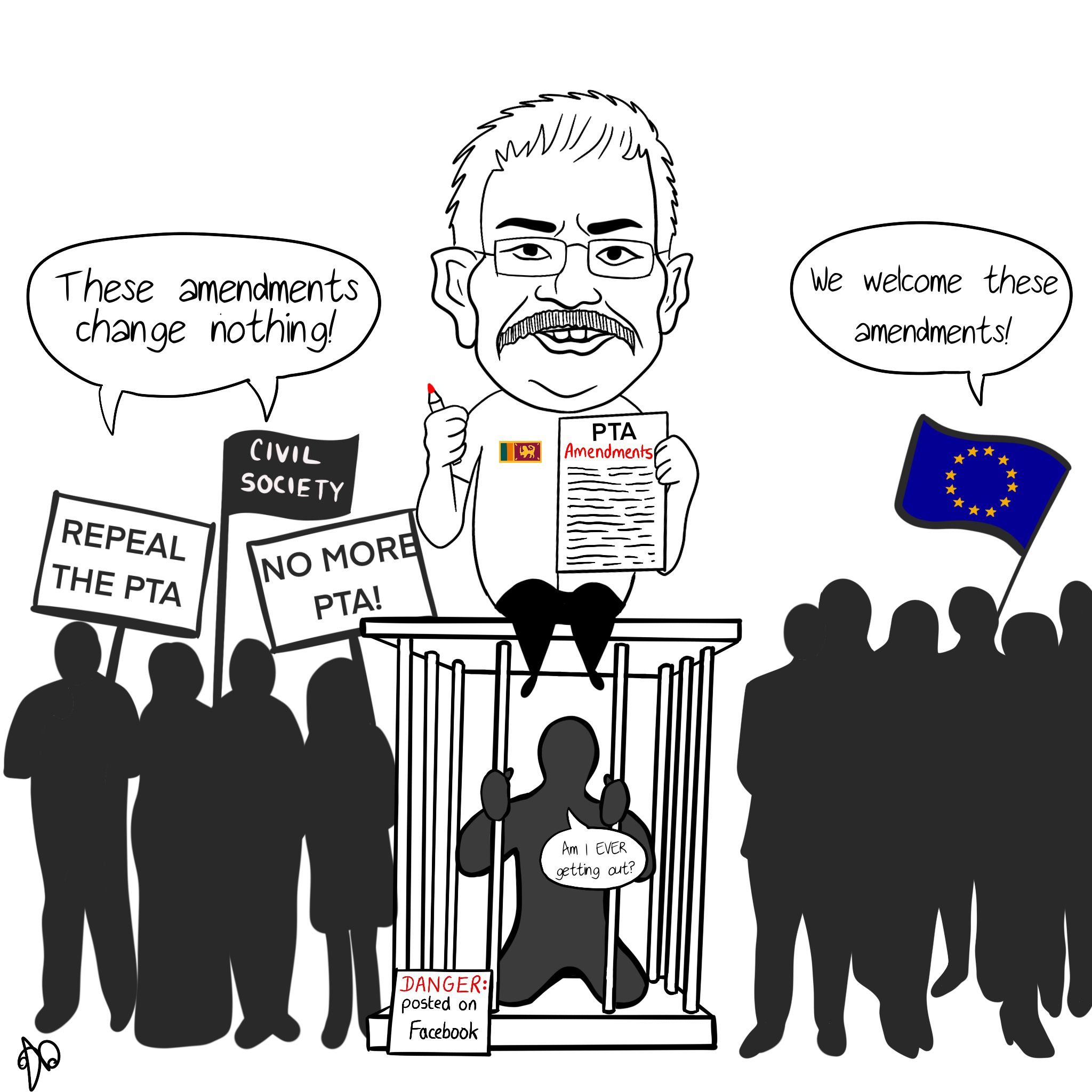
Illustration: House of Thulasi
This week, after almost 2 years in detention, Hejaaz Hizbullah was finally allowed to walk out of Sri Lankan jail. It was a welcome sight. However, the lawyer is not yet a free man. Hizbullah was only released on bail and still has an uphill battle against charges that are widely seen as trumped up. Like so many other Muslims and Tamils across the island, he remains at risk of being imprisoned again under Sri Lanka’s notorious Prevention of Terrorism Act (PTA). The draconian legislation has been a key weapon in furthering the state's Sinhala-Buddhist authoritarianism since its inception decades ago. It must be repealed.
Hizbullah’s release on bail is one that activists have tirelessly worked towards. But the timing is not coincidental, with the next session of the UN Human Rights Council starting later this month. Indeed, it has become routine for the Sri Lankan government to launch a series of superficial moves ahead of these sessions in order to give the semblance of progress on human rights. Shortly before bail was granted for Hizbullah, Sri Lanka also announced a series of ‘reforms’ to the PTA. While the government claimed the proposed reforms are the “most progressive step” towards securing fundamental rights, civil society activists and international human rights organisations have denounced them for falling far short of international standards.
The international community should call out these farcical proposals by Sri Lanka for what they are - an attempt to distract and whitewash the grave and deteriorating human rights situation on the island. Many PTA detainees are still languishing in prison. Amongst them is Kokul, a Tamil journalist who was detained under the PTA in November 2020 for posts on his Facebook account. RSF was right to term his continued detention “Kafkaesque”. But like many others, his case has seen little progress.
Ironically, in attempting to demonstrate to the European Union its progress on the PTA, the Sri Lankan government adopted a strategy of attacking a well known Tamil woman activist Ambika Satkunanathan, who has been a vocal critic of the PTA and the state’s disingenuous attempts at reforming it. In response to her submission on this exact subject before the European Parliament’s Sub Committee on Human Rights on 27 Jan 2022, Sri Lanka’s foreign ministry released a statement, attacking and accusing her of spreading “dangerous fallacies” as well as claiming her submission was “reminiscent of LTTE propaganda”. The fact that it comes at the same time the government is attempting to preach about its so-called reform, demonstrates the insincerity of any such “progress”.
The European Union’s response to all of this has been disappointing, to say the very least. Whilst on one hand it has gently called for the release of those who have not been charged under the PTA, at the same time it has welcomed the supposed reforms of the act that others have slammed. Meanwhile, there still appears to be no moves from the European Commission to instigate a withdrawal procedure of GSP + trade concession that Sri Lanka is desperate to cling on to, despite calls from European parliamentarians for it to be removed. It is actions, not words, that members of the international community will be judged by and states now need to put their money where their mouth is. In continuing to grant trade concessions to the regime whilst human rights violations continue, the EU is complicit in propping up the Rajapaksas and their abuses.
The focus on the PTA, however, must not detract from the deeper rooted, systemic problems within Sri Lanka. Indeed, the wanton use of the act - including its targeting of Tamils and Muslims, the arbitrary nature of detention, the almost routine reports of torture and the drawn out judicial process - is a marker of the problems inherent within the Sri Lankan state. Whilst the decades-long call to repeal the PTA must be heeded, any true peace can only come about if the Sinhala-Buddhist ethno-state is fully dismantled; the island demilitarised; and a political solution finally reached. Without it, Sri Lanka’s woes will not be over.
